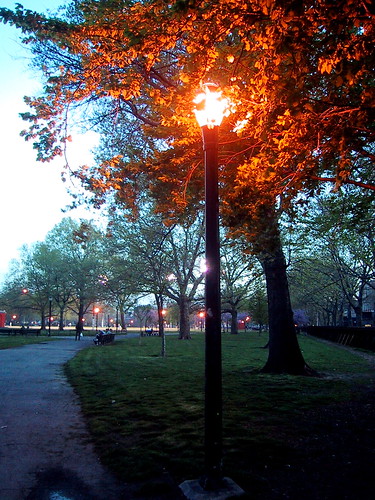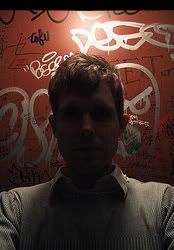The End of Literature

Woke from a dry sleep, careful not to rustle the pages as I lay there. You slept between 204 and 205 that night. I was between 200 and 201. We meet at the binding while we dream and eat through the paper like mites until our blind mouths sink into each other's. Fresh pages every few days. The spine is cracked from being laid open for so long. I can never remember to pick up my clothes.
Literature, dismayed by rumors of new storytellers that feed while sleeping and feel no hunger by day, feels obliged to uninvent itself. History rolls backward, stuffing jewels back into the mouths of our heroes, putting their hats on backwards and reminding them of their worried families and overdue bills. They are dismissed. Kisses run under fingers like Braille and race up the arms, reaching mouths but never eyes or ears, lovers gasp at the mental rockets but exhale nothing, glowing like cast-iron stoves packed hot, so perfectly hot that there is no exhaust ever, just more heat. More and more.
Speculation flies through the headlines, reinforced by omens and market trends. Global economies become obsessed with their own thoughts, and explode. Pilots point their planes at the earth for a full two minutes during each flight in an effort to unite people in wordless expiation. Ticket prices soar; people pay them. Certain products are discontinued and not missed: sunscreen, dental floss, vitamins. And books.
Books are still made but they have evolved. Not into flickering words on electronic paperscreens, but into something between a wedding cake and a letter-bomb. Thickly frosted, with pockets of dye or liqueur that will occasionally rupture and run down the wrists, staining clothes. Fold out panels of spun sugar printed with India ink, the creases laden with pollen and freeze-dried berries ground into a fine powder that stops up the throat in a spasm of wet thunder. Compressed air that suddenly sprays from a concealed jet in the binding and cools the brow so that one can smell the frakincense and cholera that's rubbed off onto one's fingertips. Unexplained flashes of heat or creamy smoke as tripwires taped between pages are pulled loose. Bindings of all shapes, with textures and grooves made to be coveted between the breasts or taken into or against oneself, figurines embedded into illustrations, radium alloy airbrushed onto their marzipan shells. A concerto within a witch's gingerbread house within an epic novel within a faberge egg. Each new volume practically oozes out of its box when delivered, like fresh fish in a newspaper. Its pages akimbo and its letters marching like ants, running like mercury, the cover sticking to fingers and its innards recondite with impossible flavors illustrating facts mined from the collective heart of living-- or from the void-- it promises a digital transfer of information to the brain, by way of heart, by way of stomach.
The first books made exclusively of edible components inspired unrest and a sort of audible sighing above the cities as the waiting began. We weren't satisfied anymore, you see. We needed to be able to take in all of it. The importance of words was eclipsed by the need for communion, for intercourse and physical transmutation, over and over again. We wanted to tattoo our organs with the things we knew, and sought creative ways to swallow the needle. The new books have come, and we, the ruminant, can feel our clockwork hitching and galloping to accomodate the strange mass, our mechanisms busting their teeth on the indigestible and incandescent compost seeded with suprahuman utterances and spongiform manifestos scattering through the body like dandelion parachutes. We excrete the paint and lithium battery-cases while our cells feed and our faces shine, but there is no name for it, and nothing to discuss. One book at a time per person, no sharing, so that we cannot continue life's illusion that anything is actually shared, nor tell if we are awake or asleep together, or whether we are making love. The world is something that happens inside each of us. Each person, every man and woman, is a star.
Together you and I broke apart our furniture to make room for the new hardware. The new models were bound in leather and velvet, with scallops sawn into their edges so that one could grip them for leverage while turning the heavy pages. The words printed in these stiff oversized texts were not meant to comfort or inspire-- we are inflated from within to the limit of our seams and have no use for these alphabetic overtures typed by the spidery fingers of machines. Having embedded whole libraries into ourselves, however, the appeal of becoming ourselves embedded became almost unbearable. The larger models were unfathomably expensive, but the ads ignited the public's imagination and with our post-human eyes we all sought to build our castles in miniature, a slim volume of Blake-ean verse writ large, perhaps, just large enough to house a couple or two. The immense pages curl over me like a shell at night, the smell is hermetic and clean. We squander in sleep what our ancestors spent their lives searching for: a feast, an idea, an other.
There is no such thing anymore as together, or alone. We have survived the death of clever. The death of ability. We have survived the death of magic by building a house from its bones. In the morning, when the sun shines through the heavy paper over my face (in transparent gold coins where my sweat has bled into it) I can see the letters from both its sides inked above me forward and backward. I hear someone, maybe you, turn over between other pages, in another chapter, and I smile at the words overhead. They are meaningless. They are embellishments that cannot describe the themes in my life or universalize my experience. They can not arouse me or read the future in my entrails. I brush the pulp from my papercut lips and sit up in bed, waiting for you to wake up.










1 comment:
Note to self-- work on this a little more, eh?
Post a Comment